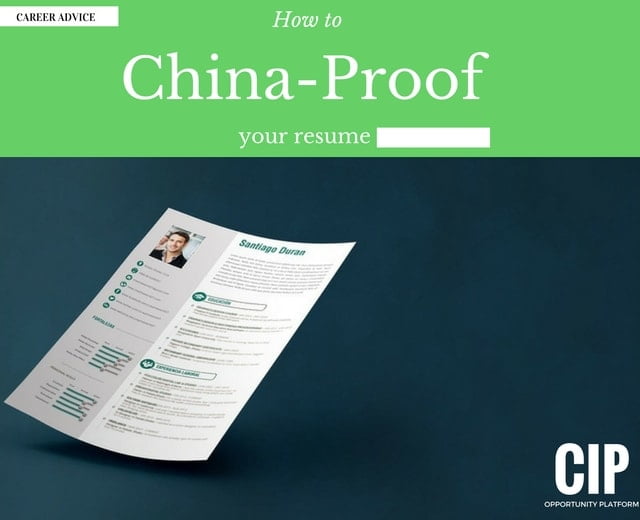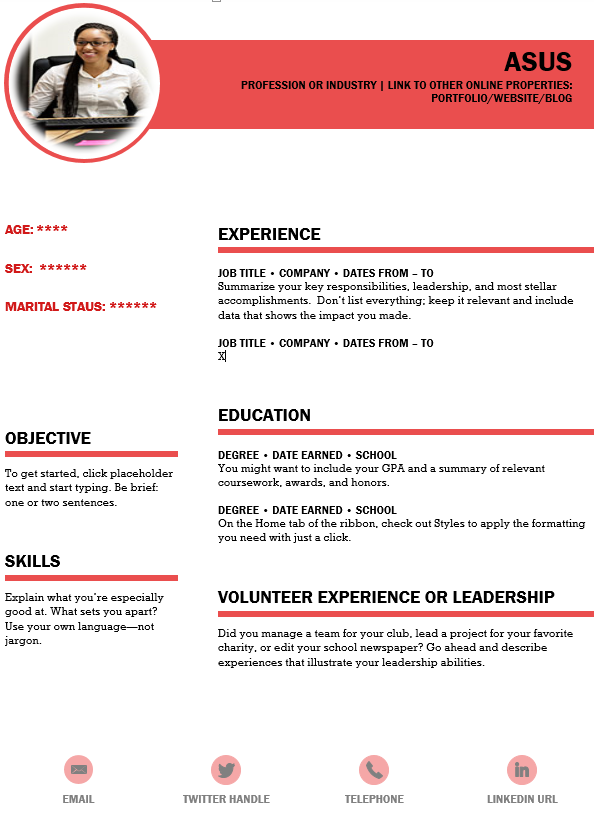Physical Address
304 North Cardinal St.
Dorchester Center, MA 02124
Physical Address
304 North Cardinal St.
Dorchester Center, MA 02124

Whether you’re looking to nail your first internship in china, or for more experience with the ones you’ve already completed, you’ll find that not all resumes are made equal. The difference between an Eastern resume and a Western resume can be so profound that many companies will have employees fill out a registration form before the interview in to secure all the information you had failed to provide in your resume. Needless to say, if HR has a “complete” resume and a Western, incomplete resume, the candidate with a more complete resume will get the call first. At China Internship Placement‘s department in charge of Applicant matching process , Our Placement Directors receive several emails and phone calls where they verify all the information interns had failed to initially provide, but which the Host Companies do demand. So, knowing this, let’s look at how you can save time and improve your chances of landing a China job!
The first thing you should do is rename your resume “CV”, short for curriculum vitae (latin), and more commonly used in Great Britain and European countries. Chinese prefer it as such. Trust me.
If you’ve ever seen a Chinese candidate registration form, you’ll note that it’s very long, detailed, and always requires a photo. Many employers will even ask you to provide a certain size passport photo for the registration form, while others will take the photo on the spot and insert it in a digital file. In essence, your CV should include all of the following:
In addition to the list of personal information that would normally be filled into a form, there might be a larger space for you to write a personal statement, or introduction, wherein you are given the opportunity to showcase why you are a good fit for the position. Most employers seem to be more interested in understanding your personality and whether you would like the work, such as if you’re an active person who gets restless sitting in the office all day, they would consider you a better fit for a position that requires traveling. If you have a family, they would discount you for traveling, but might recommend a position that has a more flexible schedule or remote work options. If you are an introvert, they will recommend a desk job with minimal phone and face time. Chinese employers don’t provide as much on the job training as Western counterparts, so they prefer placing naturally suitable candidates with existing relevant skills.
If you are a new graduate with no relevant work experience, internships, or volunteer background—you can ignore this section. The rest of you should be aware that just as with any CV; you should have a detailed account of where you worked (company name and location, e.g. Nokia, Salo, Finland), work duration, job title, responsibilities and accomplishments. What is different, then, is how you describe your responsibilities and accomplishments. Westerners are often encouraged to toot their own horn (especially in the US), but Chinese prefer a more modest description with less adjectives and more facts.
Normally, we do not include our high school education if we have completed higher education. However, in China we are expected to, along with any awards you may have received in High School.
The reason for this requirement is debatable, as some say it’s to find out how hardworking you are since an employer can tell from the ranking of your high school where you are originally from, how hard you studied, or how much money your parents spent on your education. It could also stem from the fact that Chinese universities, no matter how prestigious, are easier to graduate after one enters compared to high school or western universities, making your high school a more accurate judge of your studiousness.
Your CV should always include language skills, but if you have any Chinese proficiency, it’s important to first distinguish which dialect you can speak (e.g. Mandarin, Cantonese, Sichuan dialect), then to what level. It is not sufficient to label your Chinese knowledge as “poor” or “beginner”, but better if you can prove your proficiency level using a standardized test such as HSK or compare to a university course. It is also interesting to note that an internship in China does not warrant Mandarin Profficiency but permanent Job stand a good chance if their Language proficiency is of good standing. This is the reason we advice all our internship aparticipants to use internship opportunities to learn Chinese Language in China.
If you have no idea, at least describe to what extent you can work in Chinese:
Although we didn’t include them here, it’s quite standard to be asked for your salary history, your expected salary and benefits, and references either before or after the interview. Sometimes, job application forms will also include a section for your hobbies and interests, so at least have such answers prepared prior to meeting your employer.

Don’t forget to always produce the Chinese and English version of your Resume/CV. This settles any ambiguity surrounding the content on your Resume. Always get an Expert to review the Chinese version and this is very important to ensure you are clearly communicating and not throwing words about.
Our Content Department helps Job Candidates translate their CV into Chinese Language. We also help most Universities with this request for their Student
Do you need your CV china- proofed and translated? Contact Our Team via [email protected]